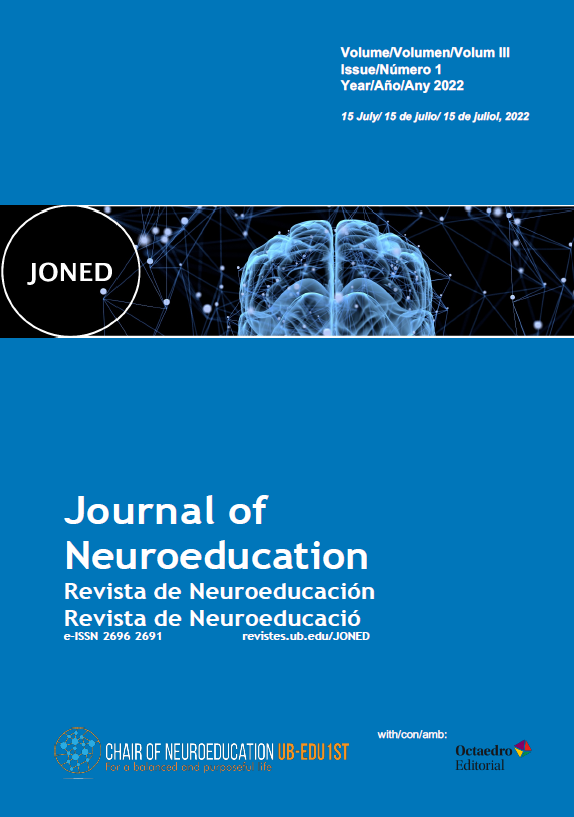Diseño universal para el aprendizaje y neuroeducación
Una perspectiva desde la ciencia de la mente, cerebro y educación
DOI:
https://doi.org/10.1344/joned.v3i1.39714Keywords:
Universal Design for Learning, neuroeducation, science of mind, brain and educationAbstract
Universal Design for Learning (UDL) is an educational framework that guides the design of flexible methods, materials, and environments that minimize barriers to learning. It is made up of guidelines and checkpoints that offer proposals for a universal design that achieves expert learning for all. These guidelines and verification points are organized around neuroscience and cognitive psychology, which allows contributions to education from a transdisciplinary study.
Downloads
References
OECD. Undertanding the brain: The birth of a learning science. París: OECD; 2002.
OECD. Undertanding the brain: The birth of a learning science. París: OECD; 2007.
UNESCO. Educational Neurosciences –More Problems than Promise? Bangkok: UNESCO; 2013.
Tokuhama-Espinosa T. Why Mind, Brain, and Education Sciences the ‘New’ Brain-Based Education. New Horizons for Learning. 2011;9(1).
Tokuhama-Espinosa T. he new science of teaching and learning: Using the best of mind, brain, and education science in the classroom. N.Y.: Teachers College Press.; 2015.
Tokuhama-Espinosa T. Conexiones: The Learning Sciences Platform [Internet]. [Video], Diferencias entre ciencia de la Mente, Cerebro y Educación; Neuroeducación y Neurociencia Educativa; 11 de septiembre de 2019 [consultado el 3 de mayo de 2022]. Disponible en: https://youtu.be/UGrldeQrmfQ
Tokuhama-Espinosa T, Nouri A, Daniel D. Evaluating what Mind, Brain, and Education has taught us about teaching and learning: 2020 International Survey. 2020; Junio 5: 14-27
Bueno i Torrens D. Neurociencia aplicada a la educación. Madrid: Síntesis; 2019. p.29
Meyer, A., Rose, D. H. y Gordon, D. T. (2014). Universal Design for Learning: Theory and practice. CAST Professional Publishing.
https://www.cast.org/news/2020/community-driven-process-update-udl-guidelines
https://udlguidelines.cast.org/more/research-evidence
Elizondo Carmona C. Hacia la inclusión educativa en la Universidad: diseño universal para el aprendizaje y la educación de calidad. Barcelona: Octaedro; 2020.
Capp MJ. The effectiveness of universal design for learning: a meta-analysis of literature between 2013 and 2016. International Journal of Inclusive Education. 2016;21(8):791-807. DOI: 10.1080/13603116.2017.1325074
https://udl-irn.org/udl-reporting-criteria/
OK MW, Rao K, Bryant BR, McDougall D. Universal Design for Learning in Pre-K to Grade 12 Classrooms: A Systematic Review of Research. A Systematic Review of Research, Exceptionality. 2017;25(2):116-38. DOI: 10.1080/09362835.2016.1196450
Baybayon G. The Use of Universal Design for Learning (UDL) Framework in Teaching and Learning: A Meta-Analysis. Academia letters. 2001: Article 692. DOI:10.20935/AL692
Dewi SS, Dalimunthe HA, Faadhil F. Journal of Social Science Studies ISSN 2329-91502019, Vol. 6, No. 1 http://jsss.macrothink.org 112 The Effectiveness of Universal Design for Learning. Journal of Social Science Studie. 2019;6(1):112-23.
Naciones Unidas. Convención de los derechos de las personas con discapacidad. Nueva York: 13 de diciembre de 2006.
Bueno i Torrens D. Neurociencia aplicada a la educación. Madrid: Síntesis; 2019; p. 50-51
Elizondo Carmona C. Hacia la inclusión educativa en la Universidad: diseño universal para el aprendizaje y la educación de calidad. Barcelona: Octaedro; 2020; p. 56
Tirapu J. ¿Para qué sirve el cerebro? Manual para principiantes. 2a ed. Bilbao: Desclée de Brouwer; 2010
Sousa D, Jensen E, Feinstein SG, Nevills P, James AN, Scaddan MA, Sylwester R, Tate ML. Neurociencia educativa. Mente, cerebro y educación. Madrid: Narcea; 2014.
Bueno i Torrens D. Neurociencia aplicada a la educación. Madrid: Síntesis; 2019; p. 124
Rueda Cuerva C. Educar la atención con cerebro. Madrid: Alianza editorial; 2021.
Grima C. En busca del grafo perdido. Matemáticas con puntos y rayas. Barcelona: Ariel; 2021.
Rueda Cuerva C. Educar la atención con cerebro. Madrid: Alianza editorial; 2021; p.
Bruning RH, Schraw GJ, Norby MM. Psicología cognitiva y de la instrucción. Madrid: Pearson; 2012; p. 222
Bruning RH, Schraw GJ, Norby MM. Psicología cognitiva y de la instrucción. Madrid: Pearson; 2012; p. 208
Ruiz Martín H. ¿Cómo aprendemos? Una aproximación científica al aprendizaje y la enseñanza. Barcelona: Graó; 2020; p. 56
Bruning RH, Schraw GJ, Norby MM. Psicología cognitiva y de la instrucción. Madrid: Pearson; 2012; p. 209
Bruning RH, Schraw GJ, Norby MM. Psicología cognitiva y de la instrucción. Madrid: Pearson; 2012; p. 210-211
Downloads
Published
Issue
Section
License
Copyright (c) 2022 Coral Elizondo Carmona

This work is licensed under a Creative Commons Attribution-NonCommercial 4.0 International License.
The authors who publish in this journal agree to the following terms:
a. Authors retain copyright and grant the journal the right of first publication
b. Texts will be published under a Creative Commons Attribution Non Commercial License that allows others to share the work, provided they include an acknowledgement of the work’s authorship, its initial publication in this journal and the terms of the license, and not for commercial use.



